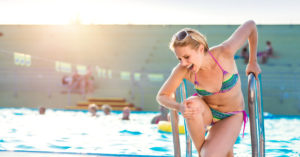Swimming Pool Injury Lawyer

Spending time by the pool sounds like an ideal way to relax and spend some time outside. But, despite all the fun and joy pools can bring, there are also many potential injury hazards in and around them.
The Centers for Disease Control and Prevention (CDC) reports that about 10 people die every day from accidental drowning. Of those 10 people, two are children age 14 or younger.
This is just one way in which swimming pools can be a major health hazard, especially for children.
If you have been hurt in a swimming pool-related accident, it’s important to speak with a qualified Virginia Beach swimming pool injury lawyer as soon as possible. You may be entitled to financial compensation for your injuries or those sustained by a loved one.
To find out more, call Ruloff, Swain, Haddad, Morecock, Talbert & Woodward, P.C., now for a free case review.
Common Swimming Pool Injuries
Many different kinds of injuries, both minor and serious, can happen in a swimming pool or in the immediate area around it.
Some of the most common types of swimming pool injuries and accidents include:
- Muscle and joint injuries – You can easily hurt your muscles, joints, or other sensitive areas of body both in the pool and outside of it. Most of us know not to dive into a shallow pool head-first, but jumping in feet-first can still lead to injury if you hit the bottom of the pool with too much force. You could twist an ankle or hurt your foot. You can also hurt yourself if you slip on a wet surface, leading to similar injuries.
- Slip-and-falls – Wet surfaces are particularly hazardous when you’re spending time by the pool. Slip-and-falls can lead to painful injuries like sprains, broken bones, scrapes, and bruises. Slipping on a wet surface can also lead to a traumatic brain injury, which is a much more serious ailment. A traumatic brain injury can lead to lifelong impairments, and even death.
- Brain injury – A child or adult can sustain a traumatic brain injury from a slip-and-fall or from drowning. Going without air for too long causes serious brain damage, which may be permanent in some cases.
- Drowning – Drowning is one of the most serious threats posed by both public and private pools. Children are especially susceptible, but adults can just as easily end up drowning in the wrong circumstances. It only takes a few moments of lax supervision for tragedy to strike if a child unknowingly falls into a pool. Drowning is the second leading cause of death for children ages 1-14.
- Paralysis – Full or partial paralysis can result from several swimming pool-related injuries. People can damage their spinal cord from slipping on a wet surface or from diving into a shallow pool at a bad angle. Permanent paralysis can significantly impact someone’s lifestyle and may mean they require 24/7 care for the rest of their lives.
Common Causes of Swimming Pool Accidents
There are many different ways that you can hurt yourself in or near a swimming pool. We’ve touched on a few of these already, but here are a few other ways that people find themselves injured while visiting a pool:
- Inexperience – Even in areas with lots of water, people may not have had any formal training when it comes to swimming. For adults, not knowing how to swim may be considered embarrassing, which means they may be even more hesitant to admit it. A lack of basic knowledge makes even reasonably safe situations much more dangerous. A basic knowledge of swimming techniques can help save your life both in the pool or when spending time near one. Furthermore, it’s important to know that pool owners can still be held liable for someone’s injuries even if the victim didn’t know how to swim.
- Electrocution – When water and electricity mix, bad things happen. Sloppy maintenance, lax supervision, and broken equipment can all lead to situations where someone comes into contact with electricity in a wet environment.
- Getting stuck in a drain – Pool drains can be extremely dangerous, especially for younger swimmers. Getting stuck in a drain can lead to drowning or disembowelment in extreme cases, both of which can prove fatal. Improperly maintained or guarded drains are a frequent case of pool injuries and deaths.
- Lax supervision – A crowded public pool or a busy neighborhood party are both dangerous situations for swimmers. It only takes a few minutes for a child to slip into a pool and drown. If alcohol is involved, the likelihood of a serious injury increases. At public pools, a lack of proper security measures like gates and lifeguards can also increase the likelihood of serious injury.
- Horsing around – It’s common for kids and adults like to splash around in pools, jump in from the side, throw each other around a bit, and so on. But doing so without taking proper safety precautions can be extremely dangerous. It’s also important to place proper signage if a pool is too shallow for diving.
Swimming Pool Safety and Liability
The liability and safety requirements in pool injury cases differ greatly when you’re talking about private versus public pools.
For both public and private pools, a personal injury claim will most likely fall under the legal concept of premises liability.
Regardless of whether your injury happened in a public or private setting, you have two years from the date of the injury to file a claim before the statute of limitations kicks in.
Public Pools
- Public pool owners must comply with federal and state safety regulations, as well as install appropriate safety equipment.
- Depending on the state, some visitors such as invitees and licensees are owed a higher standard of care. Invitees, in this context, means people who are invited to use a pool. This higher standard of care means that if pool owners do not meet that standard, they can be held liable.
- Public pool owners are required to post notices about hazards that may not be obvious to invitees. For example, if an area of the pool is too shallow to dive in but looks safe, pool owners can be held liable if there isn’t proper signage or other means of warning people about the danger.
- Public pool owners can be liable for a lack of lifeguards or other protective measures. There are even instances where states have specific laws about having certain equipment in place, and owners can be held responsible if they do not have that equipment on-site.
Private Pools
- Owners of private pools are required to warn guests of any dangers that are not obvious. This can include broken ladders, shallow pools, etc.
- Private pool owners can also be held liable if there are not adequate safety devices or there is not proper supervision of the pool area.
- Individuals who own pools are generally not responsible for anything that happens to trespassers on their property. The one significant exception, however, is children. Even if a child is not invited to use a pool, the owner could be held liable if something happens to the child when trespassing.
- In some cases, the designer of a pool can be held liable for injuries if it’s determined that the design of the pool itself led to the injury. These are fairly rare cases, though, and you should speak with a swimming pool injury attorney if you’ve been involved in such a case.
Contact Our Virginia Beach Swimming Pool Accident Lawyers Today
While a lawsuit will not undo any injuries you or your child has sustained, or bring someone back if they’ve accidentally drowned in a pool, it may help you recover vital resources to help your heal. Swimming pool accidents and injuries can require years of expensive treatment to recover from, if a full recovery is even possible. If you’re in that situation, you don’t want to be worrying about how you’ll pay those medical bills and other expenses you’ve incurred.
A skilled, experience swimming pool injury lawyer is essential in cases like these. We understand the rules surrounding swimming pools and premises liability claims, and we’ll aggressively negotiate on your behalf to make sure you get what you’re owed. If it comes to it, we can help prepare your case for trial to make sure your legal rights are represented.
You don’t pay us anything if we take your case until we collect on your behalf. This way, you can focus on recovering from your accident while we handle the legal filings and everything else that comes with your case.
If you’re interested in knowing more about your legal options in a swimming pool injury claim, call Ruloff, Swain, Haddad, Morecock, Talbert & Woodward, P.C., today. You can reach us by phone for a free, no-obligation consultation. We look forward to hearing from you.
